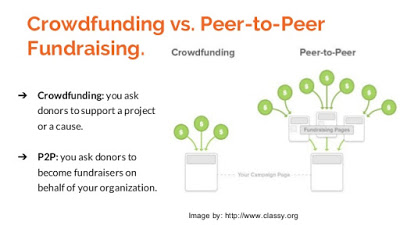Crowdfunding in the Classroom: Controversial or Simply 21st Century Fundraising?

*This post has been written as part of my journey through my Master’s Degree in Curriculum & Planning through Brandon University
Does your school participate in fundraising activities to raise money for educational resources or opportunities that fall outside of the budget constraints of your building? If so, it most likely involves students and staff petitioning their friends, family, and community selling any number of items: chocolate bars, baked goods, cooking supplies, cash calendars, etc.
At any time have you shared these endeavours through social media? If so, you have moved your traditional fundraising into the 21st century and one-step closer to the concept of crowdfunding. Traditional fundraising asks donors to support your cause by purchasing some type of item which offers you a percentage of the sales to go towards your cause. For example: 10% of all clothing items sold goes towards the purchase of new gym equipment. Crowdfunding, on the other hand, asks donors to directly support your cause where there is no exchange of goods occurring (this often utilizes online platforms for easy transfer of money).
 |
| Slide 18: Fundraising Trends. (2016). Uploaded to SlideShare by Yelena Lowenfield. Available online at: https://www.slideshare.net/YelenaLowenfeld/fundraising-trends-easy-ways-to-collect-donations |
To explore this topic further I was asked to examine a CBC article discussing the use of crowdfunding for educational resources in British Columbia through a platform called, My Class Needs. Here are two videos that provide some context regarding what My Class Needs is all about:
Here is a copy of the slides I put together discussing this topic:
Let me know your thoughts!
What sources of funding do you currently access that fall outside of traditional government funding?
Do you feel that crowdfunding is uniquely different than other fundraising campaigns your school has participated in?
Would you use crowdfunding to fund something in your building? If so, what?
Interesting post, Kirsten. I see why schools resort to this activity, but really, it should not be necessary if education was funded properly 🙁
Do you feel that proper funding would hopefully prevent any type of school fundraising? or just large-scale methods like crowdfunding?
Our school has lots of fundraising projects for various goals throughout the year; no crowdfunding though. I do like having my classroom present on social media to get the word out to more people.
I think the issue of funding our schools goes down to a philosophical level. Do we, as a society, value public education? If we do then we need to fund it properly. However, taxpayers work hard for their money and complain when taxes go up. Since we have these two opposite forces competing with one another, our politicians need to step in and mediate the two sides.
Will there ever be enough money for all of our schools? Probably not. The more you have the more you spend. I think of myself as a university student – eating KD. When I think of myself now, I still eating KD but with a steak. Spending habits will change based on the availability of funds.
The problem I have with fundraising and getting money outside of the funding formula (established by the Province of Manitoba) is the corporate involvement. Let me give you an example my concern: When big business starts to invest in schools and donates money it comes as a welcomed addition to a school’s bank account. Year over year, the same business donates money. Soon, the school comes to rely on that money for funding a program or updating their facilities. All of a sudden, the business decides it is going to put conditions on that money. What is the school to do now? It has come to rely on money for funding but now it is being told what to do. Sometimes the conditions are very minimal. It may be hanging up a sign in the gym. However, what happens when the company insists on educators delivering a lesson on a controversial topic? The educational integrity of the public school system could be in jeopardy.
On a side note, if any businesses want to build a playground for Barker school, we are looking!